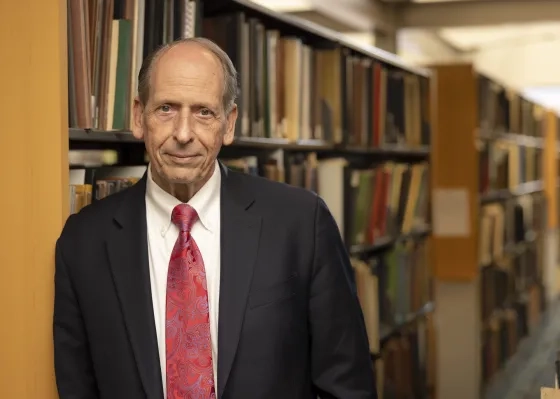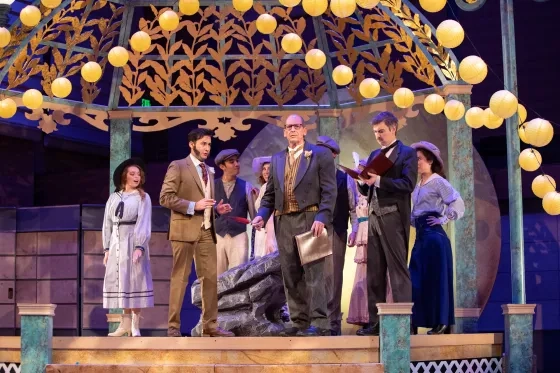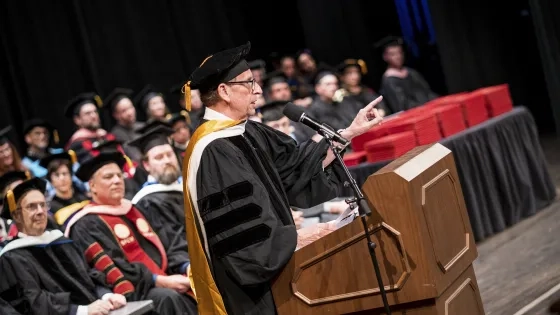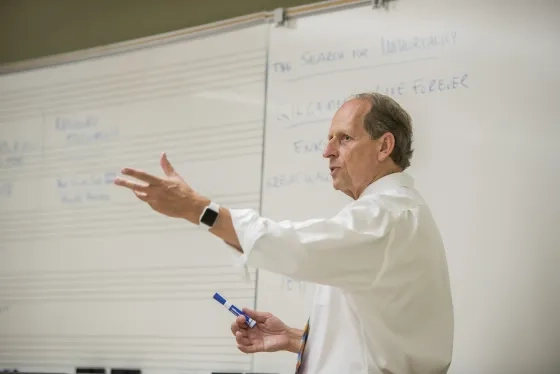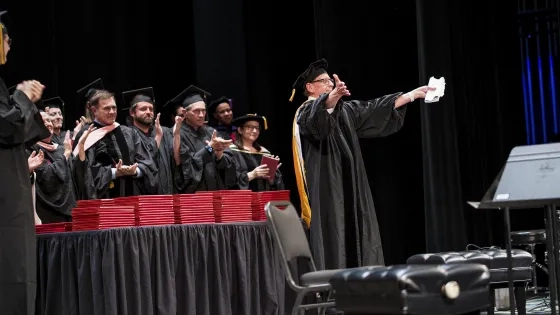'We Can Learn From Each Other:' Dr. Nikolaus Hohmann Looks Back Ahead of Retirement
After decades at the Conservatory, Hohmann, an Air Force veteran who helped run the Academy Awards for two years, is retiring.
After 33 years at the San Francisco Conservatory of Music, the Daniel E. Koshland Endowed Chair in Humanities, Dr. Nikolaus Hohmann, whose classes are frequently highlighted by students and alumni as favorites, is retiring after the Fall 2025 semester.
"Nikolaus's passion for teaching has left an enduring mark on a generation of Conservatory students," SFCM Dean (and 2005 grad) Ryan Brown says. "It has always been a source of pride for me that SFCM's most beloved teacher is in the Humanities and Sciences Department, rather than a music-focused area. He has been an unwavering source of support for me personally and someone I have relied on for an unbiased perspective and an ability to encourage change while drawing on a rich institutional memory."
Brown continued, "We should all consider ourselves lucky to have worked with him for so long, experiencing his warm smile, his thoughtful gestures, his encouraging words, and his exceptional, curious mind, shared through incredible lectures and casual conversations."
Hohmann's road to SFCM began at 6 years old when he and his mother emigrated from Stuttgart, Germany to Edmonton, Alberta, Canada. She worked as a secretary in the legislative building and would spend her lunch break in the library, where one day she found a book that named San Jose as one of the most beautiful cities in the U.S.
"This was 1959," Hohmann says, laughing, "and I assume it wasn't a new book. But San Jose used to be very admired for all its orchards, even though all I wanted to see was palm trees and was a little sad when I didn't after we arrived there in 1960."
Graduating high school a semester early at the height of the Vietnam War and the draft, Hohmann enlisted in the Air Force ("I figured to avoid the draft the best defense was a good offense") and was stationed first in North Dakota and then the Philippines. Returning home, he enrolled at Foothill Community College for two years, before transferring to Stanford.
After his undergraduate studies, Hohmann was selected by the accounting firm Pricewaterhouse (now PricewaterhouseCoopers) for a post-graduate intensive and secured a job with them. He moved to Los Angeles—an offense for which his Bay Area friends called him a traitor—where, among many assignments, he became part of the team that runs the Academy Awards balloting every year.
"It's probably the most glamorous job I ever had," he recalls. "And it was being in Hollywood—meeting big stars—without being part of the industry, which was a huge advantage, because Hollywood can be a rather cutthroat place."
"I was in L.A. for two years," Hohmann continues, "making a lot of money; I had a beautiful 3-story townhouse on the West Side, a really lovely car, I ate at the best restaurants. I had everything I wanted, and I was incredibly miserable."
Hohmann decided to return to the Bay Area with teaching in mind, and in 1980 started his PhD program at UC Berkeley. He moved to West Berlin to do dissertation research, ultimately spending four years in Berlin, "primarily because I was having such a great time. But the unexpected benefit was that I was living in West Berlin when the Berlin Wall fell in November 1989. As a fledgling historian, it was especially spectacular to live through a major historical event that I knew was going to be in the history books. I wrote about my experiences to a friend of mine, who forwarded the letter to his father, a British MP, and parts of that letter were then read to the British House of Commons in December 1989."
"Eventually I had an attack of conscience and decided to come back to Berkeley and actually write my dissertation," he says. "That all went really well, and when I started looking for a job, I bumped into a friend from my program in Sproul Plaza at UC Berkeley who said he was moving back to Oklahoma. He encouraged me to apply to the job he was vacating, which was teaching Western Civ at the San Francisco Conservatory of Music."
Hohmann's well-received sample lesson was on German Romanticism and he began working at SFCM in 1992. "I had to teach 14 courses over three years, all of them completely new courses, which for any ordinary academic is a nightmare." But he didn't see it that way. "It was perfect, because I'm constantly learning and I love exploring," he explains. "I teach the history of China, right? I knew nothing about Chinese history at the time, as I knew only the basics about many of the courses I had to teach. But it was just wonderful to explore and learn and put things together. I still love creating lectures. I really do."
Hohmann has weathered the changing mores of academia and the wider world by adhering to a basic principle in his teaching. "There are basic human dynamics and truths at work—whether in history or philosophy or metaphysics or ethics or aesthetics—that are always relevant to what's going on," he says.
But despite this grounding, he is constantly updating his classes with new information, keeping in mind that teaching is a two-way street. "One of the gravest problems is when people in a profession get bored with their profession and become cynical," he says. "It's true in medicine, engineering, and academics, but that's not my case. I love teaching, I love what I teach because I'm constantly exploring and adding new things … When we have classroom discussions, you learn a lot from students because, of course, their experiences are different, and so we can learn from each other."
Asked what he plans to do with his newfound free time, Hohmann answers simply, "Read a lot of mysteries." But before that, he gave a touching speech at SFCM's 2025 Commencement that offered this forever-relevant benediction to the Conservatory's students.
"It's important to remember that the arts are very fragile," he said. "The number of beautiful paintings, exquisite sculptures, and magnificent buildings that have been destroyed are countless. And you know, of course, don't you, that music is the most fragile of all the arts. This means that since art is so easily destroyed, art and beauty need to be protected. And this is one dimension of what you as musicians and as composers do. You protect music in that you continue to play it. Allow this music to live for your generation and prepare it for the next generation. You are part of the continuity of the life of music."
The long standing ovation made it obvious that his final sentiment was mutual.
Learn more about SFCM's Humanities and Sciences Department.
